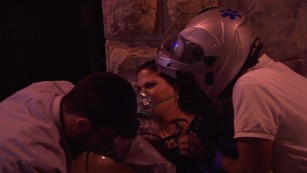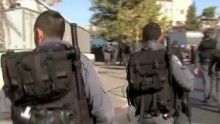Joseph's Tomb site set ablaze amid wave of Palestinian-Israeli violence
A group of Palestinians set fire overnight to a compound housing Joseph's Tomb -- a religious site in the West Bank venerated by Jews -- sparking condemnations from Palestinian and Israeli authorities.
The tomb appeared to be unharmed, but the fire marked another downturn in the Israeli-Palestinian conflict after weeks of renewed violence, including the stabbings of Israeli civilians and clashes between Palestinians and Israeli forces.
Jews consider the site in Nablus the final resting place of Joseph, a high Israelite patriarch and son of Jacob who, according to biblical accounts, was sold into slavery as a boy but then rose to become a powerful figure in ancient Egypt, second only to the pharaoh.
Jewish devotees at times go to the tomb under Israel Defense Forces escort at night to pray. Christians also consider Joseph's Tomb a holy site. It's been targeted before -- including in 2011 when vandals painted swastikas on its walls.
According to a Palestinian official, people went to the site early Friday to erect a barricade to thwart Israeli troops from demolishing homes, a key bone of contention in the Mideast. Israeli officials say tearing down homes of terrorists can deter future attacks, while Palestinians see the tactic as unfair collective punishment that hurts innocent women and children.
At some point, a group tried to set fire to Joseph's Tomb, said the official, who did not want to be named.
But Palestinian security forces pushed out the crowd and managed to put out the fire.
Vow to bring perpetrators of 'despicable act to justice'
Palestinian Authority President Mahmoud Abbas -- whom Israeli officials have accused of not being vocal enough in condemning attacks on Israeli civilians -- quickly spoke out about the torching of the religious site.
"These kinds of acts, or any other acts that violate the law and order ... offend our culture, religion and morals," Abbas said, according to WAFA, the official Palestinian news agency.
Abbas ordered a committee to investigate, WAFA reported.
But such a move may not placate some Israelis.
David Halvry, a spokesman for Jewish settlers in the West Bank, called on Prime Minister Benjamin Netanyahu to have Israeli troops "retake full responsibility for the holy place."
IDF spokesman Peter Lerner promised action.
"The burning and desecration of Joseph's Tomb ... is a blatant violation and contradiction of the basic value of freedom of worship," Lerner said. "The IDF will take all measures to bring the perpetrators of this despicable act to justice, restore the site to its previous condition and ensure that the freedom of worship returns to Joseph's Tomb."
Situation on U.N. Security Council agenda
The fire follows a spate of recent violence, with both sides trading blame about who is responsible.
In the past month, eight Israelis died in 30 attacks involving knives and other weapons, with many more being wounded. Some of the worst have been in Jerusalem -- though Israelis have been targeted elsewhere.
The IDF said Palestinian attackers have wielded knifes against Israeli civilians and authorities, and Israeli security forces have turned their guns on them. Israeli authorities have also fired during Palestinian protests that have turned riotous.
Five Palestinians were killed Friday in clashes with Israeli forces in the West Bank and Gaza, the Palestinian Ministry of Health said.
Also Friday, 269 Palestinians were injured during confrontations with the IDF in the West Bank, the Palestinian Red Crescent told CNN.
Earlier, Palestinian officials said more than 30 Palestinians have been killed in the past month. More than 1,100 have been injured, mostly in fighting with Israeli forces.

Lone wolf attacks: Jerusalem on edge
The United States -- consistently supportive of the right of Israelis to defend themselves and usually reserved in its criticism -- has expressed concern about Israeli security forces allegedly using live ammunition in the face of rock-throwing Palestinian youths.
The U.N. Security Council is meeting Friday over the unrest.
Attacks not believed to be organized
The recent knife attacks have confounded Israeli authorities. They have spent millions to prevent suicide bombings with high concrete barriers and to stop rockets from Gaza with the Iron Dome anti-missile system.
But a knife is easy to obtain and carry into a crowd. Israeli authorities so far don't believe the attacks are the result of any campaign of violence organized by militant groups.
Hamas, the militant group that rules Gaza, has praised the attacks but not claimed responsibility for them.
It's often young Palestinians who may be acting out alone or recruited or at least encouraged via social media, Israeli authorities have said.
Civilians arming themselves
In this atmosphere of fear, many Israelis are changing the routes of their commutes, and many who have handgun permits are carrying weapons. Others are applying for permits.
The Israeli government has even called for them to do so.
"The responsible civilian population -- in the framework of the rule of law -- has a part to play," Israeli government spokesman Mark Regev said Thursday. "We've urged Israelis to be vigilant. ... Having the civilian population work closely with law enforcement is one of the keys in defeating this threat."
In recent days, Israeli security forces have swiftly shot dead two Palestinian teenagers who attacked with knives. Abbas, the Palestinian President, accused Israel of committing what he called "extrajudicial executions."
A coalition of human rights organizations -- including Amnesty International and theIsraeli Information Center for Human Rights in the Occupied Territories -- has said police and soldiers are "too quick to shoot to kill" and criticized calls for civilians to carry weapons.
Clashes at holy site
Palestinian resentments are hardly new, but Israelis and Palestinians have had better relations at times.
Those have since been buried by the second intifada, in which organized deadly attacks targeted Israelis from 2000 to 2005, and three wars in Gaza that killed thousands of Palestinians.
Hard-line Jewish activists have begun demanding greater access to the Temple Mount, the holiest site in Judaism, in Jerusalem's Old City, and right-wing politicians have called for the rights of Jews to pray there. Known as Haram Al-Sharif or the Noble Sanctuary to Muslims, it's also one of the holiest sites in Islam.
The Palestinian representative to the United Nations, Riyad Mansour, has accused Israeli security forces of escorting Jewish hard-liners onto the Temple Mount and into the al-Aqsa Mosque compound.
Clashes at the site have become common.
Jewish settlements
Attempts by the United States to revive the Mideast peace process have fallen flat for more than a decade, with the most recent hopes being dashed last year, followed by the third Gaza war.
In the meantime, Israel has forged ahead with the construction of Jewish settlements in the West Bank, which cut crisscrossing furrows through Palestinian territory.
This week, U.S. Secretary of State John Kerry addressed the boom in settlements.
"There's been a massive increase in settlements over the course of the last years," Kerry said. "Now you have this violence because there's a frustration that is growing, and a frustration among Israelis who don't see any movement."
News Courtesy: www.cnn.com











